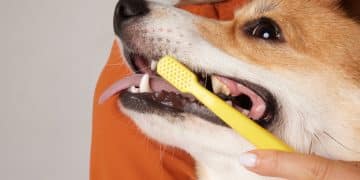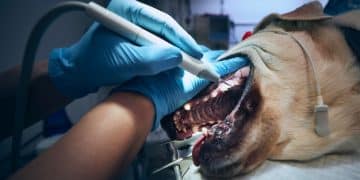Boost Your Pet’s Life: The Dental Health Benefits of Daily Brushing
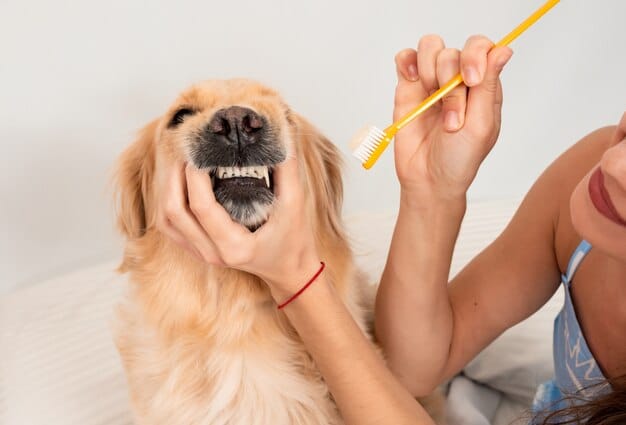
Anúncios
Dental Health Matters: How Daily Brushing Can Add 2 Years to Your Pet’s Life is crucial for their well-being, potentially extending their lifespan by preventing dental diseases that can lead to systemic health issues, emphasizing the importance of daily oral care.
Did you know that neglecting your pet’s dental health could be shortening their lifespan? Dental Health Matters: How Daily Brushing Can Add 2 Years to Your Pet’s Life is a serious topic often overlooked by pet owners, but consistent oral care can significantly improve your furry friend’s overall health and longevity.
Anúncios
Understanding the Importance of Pet Dental Health
Just like humans, pets are prone to dental diseases that can cause pain, discomfort, and even systemic health problems. Neglecting their oral hygiene can lead to serious consequences, impacting their quality of life and potentially shortening their lifespan. Understanding the importance of pet dental health is the first step in ensuring your beloved companion lives a long and healthy life.
Good dental hygiene isn’t just about fresh breath; it’s about preventing a cascade of health issues. Poor dental health can lead to heart, liver, and kidney problems. Daily brushing can be a simple yet effective way to significantly reduce these risks.
Anúncios
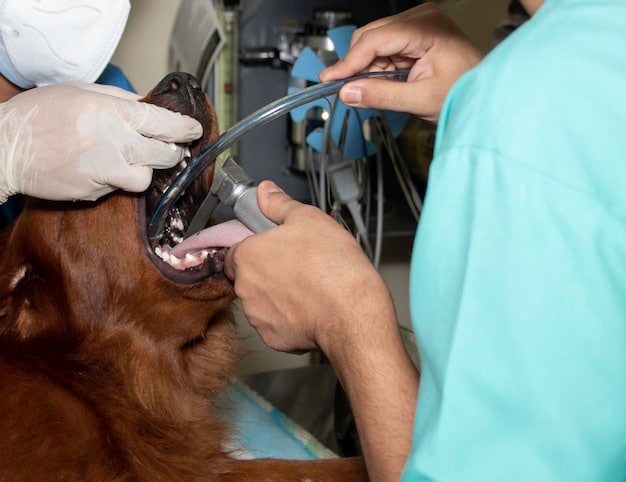
The Alarming Statistics: Pet Dental Disease Prevalence
The numbers speak volumes about the prevalence of dental disease in pets. It’s estimated that a significant percentage of dogs and cats show signs of dental disease by the age of three. These conditions not only cause pain and discomfort but can also lead to more serious health complications. Recognizing the scope of the problem is crucial for taking proactive measures.
Many owners are unaware of the silent suffering their pets endure due to dental issues. Understanding how common these problems are serves as a crucial call to action.
Common Dental Issues in Pets
Pets can experience a range of dental problems, mirroring many of the issues seen in humans. Being aware of these common aliments can help with early detection and treatment.
- Gingivitis: Inflammation of the gums, often indicated by redness and swelling.
- Periodontitis: Advanced gum disease that can lead to tooth loss and bone damage.
- Tooth Abscesses: Infections around the tooth root, causing severe pain.
Each of these conditions can contribute to systemic health problems if left untreated. Regular check-ups and a solid at-home dental care routine are essential.
Daily Brushing: Your Pet’s First Line of Defense
Daily brushing is the cornerstone of good dental hygiene for your pet. Just like humans, regular cleaning helps remove plaque and tartar buildup, preventing the development of dental diseases. Making brushing a part of your daily routine can significantly improve their long-term health.
Starting a brushing routine early in your pet’s life is ideal, but it’s never too late to begin. Even older pets can benefit from improved oral care.
Choosing the Right Tools
Selecting the right toothbrush and toothpaste is essential for effective and comfortable brushing.
Using human toothpaste on pets is a no-no. It can cause tummy troubles because of the ingredients, and trust me, your furry pals won’t appreciate that. Pet-specific toothpastes come in flavors they’ll actually enjoy, like chicken or peanut butter, making brushing time a whole lot easier.
- Pet Toothpaste: Always use toothpaste specifically formulated for pets.
- Pet Toothbrushes: Use a toothbrush designed for your pet’s mouth size and shape.
- Finger Brushes: A good option for pets who are resistant to traditional toothbrushes.
Having the right tools will not only make brushing more effective but also more enjoyable for both you and your pet. Experiment until you find what works best.
Step-by-Step Guide to Brushing Your Pet’s Teeth
Brushing your pet’s teeth might seem daunting, but with patience and the right approach, it can become a positive experience for both of you. Here’s a step-by-step guide to help you get started.
The key is to introduce brushing gradually and make it a fun, reward-based activity. Never force your pet, and always end on a positive note.
- Introduction: Start by letting your pet taste the toothpaste.
- Gentle Touch: Use your finger to gently rub their teeth and gums.
- Brush Slowly: Gradually introduce the toothbrush, focusing on the outer surfaces of the teeth.
Remember to be patient and consistent. Over time, your pet will become more comfortable with the process.
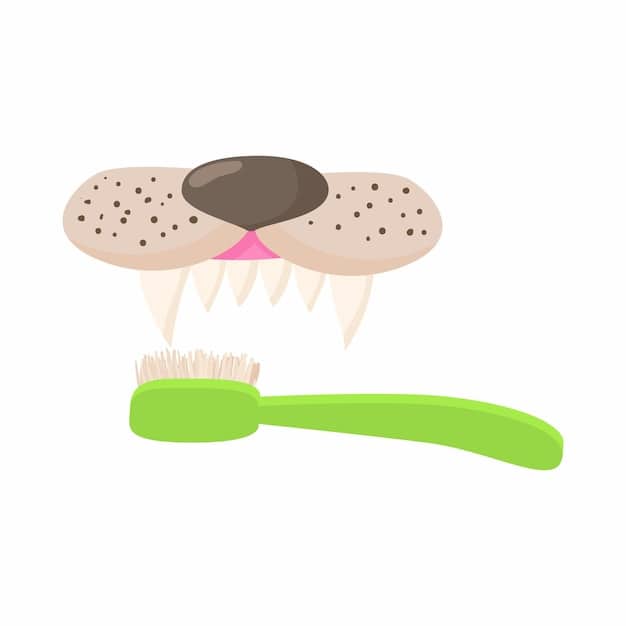
The Connection Between Dental Health and Longevity
The link between dental health matters: how daily brushing can add 2 years to your pet’s life is more direct than you might think. Dental diseases can trigger inflammation and infections that spread throughout the body, affecting vital organs. By maintaining good dental health, you reduce the risk of these systemic issues, potentially adding years to your pet’s life.
The impact of oral health extends far beyond the mouth. It affects their overall well-being and lifespan.
How Dental Disease Affects Other Organs
The effects of dental disease can be far-reaching, impacting multiple organs and systems.
If your pet has a severe tooth infection that goes untreated, bacterias might find it’s way into their bloodstream, potentially triggering other problems across the body, such as organ damage. That it why it’s important to keep up with your pets hygiene, if not it can cause some serious complications!
- Heart: Bacteria from dental disease can damage heart valves.
- Kidneys: Chronic inflammation can contribute to kidney disease.
- Liver: The liver can be affected by the body’s response to chronic infections.
Preventing dental disease is a holistic approach to pet health, protecting not just their teeth but their entire body.
Professional Dental Cleanings: What to Expect
While daily brushing is essential, professional dental cleanings are also a critical part of your pet’s oral care. Veterinarians can perform a thorough cleaning under anesthesia, removing plaque and tartar from below the gumline. Knowing what to expect during these cleanings can help alleviate any concerns.
These professional cleanings provide a level of care that home brushing simply cannot achieve. They are essential for maintaining optimal dental health.
The Process of a Professional Cleaning
Understanding the steps involved in a professional dental cleaning can make the process less intimidating.
- Anesthesia: Pets are put under anesthesia to ensure a safe and thorough cleaning.
- Scaling and Polishing: A veterinarian removes plaque and tartar from the teeth.
- Examination: The veterinarian examines the mouth for any signs of disease or abnormalities.
Professional dental care, combined with daily brushing, is the best approach to maintaining your pet’s oral health.
| Key Point | Brief Description |
|---|---|
| 🦷 Daily Brushing | Removes plaque and tartar, essential for dental health. |
| 🩺 Regular Check-ups | Professional cleanings help prevent severe issues. |
| ❤️ Health Connection | Good dental health improves overall organ function. |
| 🪥 Right Tools | Pet-specific toothpaste and brushes are essential. |
Frequently Asked Questions About Pet Dental Health
▼
Ideally, you should brush your pet’s teeth daily to prevent plaque and tartar buildup. If daily brushing isn’t possible, aim for at least a few times a week.
▼
No, human toothpaste contains ingredients that can be harmful to pets. Always use toothpaste specifically formulated for animals, as they are safe and palatable.
▼
Signs of dental disease include bad breath, excessive drooling, difficulty eating, bleeding gums, and loose or discolored teeth. Contact your vet if you notice any of these symptoms.
▼
The frequency of professional cleanings depends on your pet’s individual needs, but most pets benefit from a cleaning every one to two years. Consult your veterinarian for guidance.
▼
Start slowly, using positive reinforcement. Let your pet taste the toothpaste and gradually introduce the toothbrush. If they resist, try a finger brush or dental wipes.
Conclusion
Prioritizing your pet’s dental health is a vital component of responsible pet ownership. By incorporating daily brushing and regular veterinary dental check-ups into your routine, you can significantly enhance your pet’s quality of life, potentially adding valuable years to their companionship.

